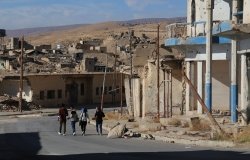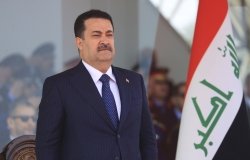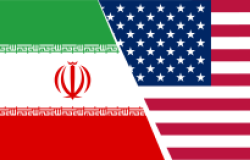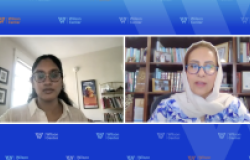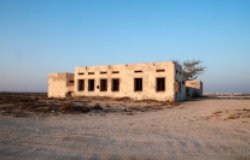Women, Democracy, and Peace: The Cyprus Example
Oya Talat, Political Advocate; Spouse of Mehmet Ali Talat, "Turkish Cypriot President."This event was cosponsored by the Middle East Program and the Project for Leadership and Building State Capacity.
Overview
Oya Talat, Political Advocate; Spouse of Mehmet Ali Talat, "Turkish Cypriot President."
This event was cosponsored by the Middle East Program and the Project for Leadership and Building State Capacity.
The following letter was written by Oya Talat and served as a basis for her presentation at the Wilson Center on October 28, 2005. The opinions expressed here are those of the author and in no way represent the views or opinions of the Woodrow Wilson International Center for Scholars.
Dear Host and Distinguished Guests,
I would like to thank you all for providing me with this opportunity to express my views.
Women's contribution to form a modern and civil society cannot be ignored or denied. However the patriarchal mode of society, which still predominantly constitutes our world, is unwilling to accept this fact. The opinions, expectations, and concerns of women are still being subordinated and receive insufficient attention if any at all. Yet the very fact that a healthy society, and strong democracy could not be achieved without the contributions of women, is more valid than ever before. Women still have an unequal share of means in a male-dominated world. Women still have limited access to public life compared to their male counterparts. We all know that up to 70 per cent of women suffer from poverty.
Gender inequalities and sexual discrimination against women are still so widespread that women are far away from enjoying their lives as their male counterparts do. It is upsetting that until today no policy could be created to reconstruct and correct the existing defects of the dominant mode of society, which encourages the discrimination of women. Despite all the women's conferences and the UN decisions signed by many of the world's nations, the developments -unfortunately- are not very promising. This is the reason why women themselves have to participate and take their rightful position in the decision-making mechanisms so that they can raise their voices and have a significant influence on every issue. In other words it is the women who need to represent women's issues, concerns, and opinions –needless to say- with the assistance of legally binding international laws.
The current ethnic conflicts in our 'globalizing world' cause a loss of hope for a peaceful and a better future for us all. As violence and wars, as well as ideological and religious conflicts, continue in the world, we as women have not been successful in expressing our dissent, neither in our own countries nor in the international arena. It is an important duty for us to support each other in a more organized manner to make peace and a violence-free world possible. Despite our different political perspectives we can utilize the wonderful features of being a woman such as reproductiveness, love and compassion to leave a more comfortable, peaceful and secure legacy for the next generations. Meetings like this should serve as an opportunity to question our efforts, refresh our goals and evaluate our progress by sharing our experiences and strategies.
Let me now turn to my birthplace and home. Cyprus is a Mediterranean island where Turkish and Greek Cypriots live together with Latin, Armenian and Maronite minorities. The Republic of Cyprus was established in 1960 as a free and independent state in which the two communities had administrative rights- proportionate with their population- in a federal structure. However, Cypriots have never lived in peace since the Republic of Cyprus was damaged by the discrepancy of interests and understandings between the two communities in 1963. After long conflicts and the coup organized by the Greek military junta in order to unite Cyprus with Greece, Turkey intervened in 1974. The establishment of a peace agreement that both sides would accept was always postponed. Under such ambiguous circumstances with the Cold War still going on, the Turkish Cypriot State in the North was established.
It was only recognized by Turkey and isolated from the rest of the world and hence suffered from economic underdevelopment. In retrospect, I always remember the fear of conflict that we had in Cyprus between Turkish and Greek Cypriots. This was bad luck for our generation regardless of being Turkish or Greek Cypriot. We are the generation, which has seen the destructive and ugly face of war. This is why I became an ardent peace activist. I struggle for women's rights and try to empower and mobilize them to be more active in the decision-making process.
I am also one of the founders and the first president of The Movement of Women for Peace and Federal Solution for Cyprus. I believe women must be involved in politics. This is why I am also an active elected member in the Council of the left-wing Republican Turkish Party. As the Patriotic Women's Union, which is for a peaceful and sustainable solution for the Cyprus conflict, we demand to be a part of the negotiation process.
The women of the Turkish Cypriot community could not become organized until the 1930's. Although they had Islamic traditions from the Ottomans, they also adopted some values from Greek culture as a result of co-existence on the island. Then during the British era they were exposed to European culture. The Turkish Cypriot women first began to organize after the Turkish War of Independence as a result of the positive influence of Kemalist reforms in Turkey. The urban women who had access to education- with the aid of intellectual women who came from Turkey-gathered in charity organizations and initiated grassroots activities.
Even though notions like 'women's rights' and 'democracy and economic development' were not their primary objectives, these women came together and formed a medium in which they could speak up and voice their problems. Some women in leading positions had to go through unjust treatments since they were still operating under a patriarchal society. However they were seen as harmless as long as they did not interfere in important matters of their community. The members of such organizations were mainly teachers and middle class women and their charity efforts brought affirmative responses. After a while some of these women realized that their husbands' careers benefited from their activities in civil society organizations and for this reason continued to work with even more enthusiasm. This is still true for some women's organizations and especially for women's groups formed with the support of political parties. This ongoing trend has even taken the form of a tradition. Women who are reluctant to enter active politics have devoted themselves to assist their husbands' goals with great determination.
In 1976 a group of young women began to return to Cyprus after being politically active in Turkey in their university years especially on the left. This was the start of a new era in the history of women's movement in the Turkish Cypriot community. As most of these women were proponents of the women's movements in the left-wing organizations in Turkey, they decided to organize in Cyprus as well. I am very honored to be among those women who established the Patriotic Women's Union. This particular women's organization surprised those conventional women who were mainly involved in charity work and had no demands on the position of women in society. It was definitely the dominant right-wing oriented section of society, which found it rather hard to understand what was happening. This was a women's movement that was talking about change, revolution and peace. We were arguing that work was sacred and that the importance of women's labor had to be realized. We were arguing for the right to motherhood and demanding free nurseries and schools for our children. We were raising our demand for a modern education cleared from chauvinism. We were opposing high prices. We wanted women to be emancipated from confinement to their homes and demanded jobs so that women could actively participate in economic life. We advocated equal pay for men and women for doing the same job and equal treatment of men and women in the work place especially in promotion.
Our demands as well as our marches for peace were enough to disturb the dominant powers. Women's demands and their encounters with the authorities were rather unusual. Our country was getting acquainted with the feminist women's movement and the organization was gaining the sympathy of many women despite all obstacles. Proposing bills to the parliament, demanding the reform of existing laws, the declaration of the family law as outdated, supporting children's rights and the environmental issues. All these were achieved by this organization for the first time.
We were also inviting the Greek Cypriot women to cooperate and to join us in a mutual struggle for peace. The Patriotic Women's Union had managed to communicate and cooperate with their Greek Cypriot counterparts despite all legal difficulties As we aimed to be a member of the Women's International Democratic Federation, we felt the difficulties of being from an unrecognized country, and our offended identities showed us once again how very important the Cyprus problem was. As a result, we wanted to widen our area of activity. Believing that peace in Cyprus would only be achieved through a federal solution, we founded the Women's Movement for Peace and a Federal Solution with the support of the Patriotic Women's Union in 1986. The mission of this movement is still valid and will continue until we reach our goal of legally possessing our identities as Cypriot women through a permanent solution of the Cyprus problem.
After the proclamation of the United Nations decade for women in 1975 and the acceptance of the agreement demanding the elimination of discrimination against women in 1979, the Patriotic Women's Union increased its activities in defending the rights of women and added the issue of "quota" to its agenda in the 1990's. We now argued that the only effective way of making women enter the decision-making mechanisms would be through the implementation of quotas. An atmosphere in which women's problems were acknowledged was gradually created, and this was the very proof of the societal benefits of an organized women's groups work in solidarity. From 1995 onwards, we have been inviting other women's organizations into cooperation. As a result of our cooperation with the Women's Platform, we have managed to reform the family law. We have also managed to cooperate in important areas such as conflict resolution in successful solidarity that men have not yet achieved.
We are determined to continue our efforts despite all the difficulties and pressures imposed on us by the conservative attitudes and their stubborn ignoring of women's very existence. However we are glad to have been able to change the political power in North Cyprus, which is now very supportive of our demands. After the elections in 2004 we have 3 women MPs, one of them being the speaker of the parliament. There are positive changes in the Turkish Cypriot society that are in parallel with the values and norms of the EU and other developed societies. Our struggle to change the male dominated society, which is closely related to the whole change and progress of the democracy and the equality of men and women, will continue.
Hosted By

Middle East Program
The Wilson Center’s Middle East Program serves as a crucial resource for the policymaking community and beyond, providing analyses and research that helps inform US foreign policymaking, stimulates public debate, and expands knowledge about issues in the wider Middle East and North Africa (MENA) region. Read more
Thank you for your interest in this event. Please send any feedback or questions to our Events staff.

